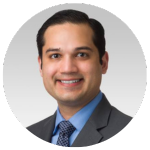Exploring the Interview Process
In our series of articles exploring the dermatology interview process, we present several thoughtful questions which should be considered by both the applicant and the hiring authority. We discuss questions an interviewer should ask when interviewing a candidate and questions a candidate should ask the hiring authority. Thoughtfully prepared questions considered by both parties throughout the process offer a greater opportunity to identify the best fit for the position. There are some valuable questions a dermatologist should consider prior to applying for a position that will further aid in this process.
What to Consider Before Applying for a Position?
Whether you recently graduated, are relocating to a new city, or simply wish to expand the breadth of your job experience, you are considering submitting your curriculum vitae to a prospective employer. Applying for a new position is exciting but it can also be a bit daunting. You want a position that will be a good fit for you. You want a position that will challenge you and set you on the path of continued success. You want a position that will be fulfilling and make you happy
Before you submit your application, it is wise to spend a few moments considering what your ideal position looks like. Not every position will fulfill your needs. Taking a few moments to consider what you are really looking for will ensure you only apply for positions that meet the criteria.
What are you really looking for in a career?
Before you get to the point of applying for a position, take a few moments to consider this important series of questions. Doing so will help you determine what size and type of practice you desire, what specifics of the position will work best for you, and ultimately what positions will make you the happiest in your career. These questions can also act as a springboard for your interview preparation.
- What type of practice structure and specialty are you looking to specialize in?
- Are you looking for a full-time or part-time job?
- How long would you like to work, and what maximum patient load are you comfortable with?
- What kind of call schedule would you like to have?
- Which aspects and philosophies are important to you when working with a practice, and what are the aspects you don’t want to deal with?
- Do you prefer a small or large practice?
- Would you like to work at one location or at multiple locations?
- What patient demographic(s) would you like to work with?
- Do you prefer working mostly autonomously, or you would like to have a large support staff assisting you?
- What are your short-term and long-term goals?
- Would you eventually like to run your own practice?
What’s next?
You have considered your ultimate position and applied for positions that meet your needs. Chances are you will want to brush up on your interviewing skills. As you practice how you will answer the myriad of questions that will certainly be asked about your education, experience, and patient care philosophy, you may also want to consider making a list of some questions of your own.
The best job interviews are conducted as two-way conversations. That doesn’t always happen, but it is helpful for you to approach every job interview from that perspective. The interview process provides an opportunity for a hiring manager to determine if an applicant is a good fit for their position. You should be prepared to confidently answer the interviewer’s questions to help them accomplish this objective, but it shouldn’t stop there. Not every job opportunity is an opportunity you should take. When you prepare a list of your own specific questions it gives you some control over the interview process and allows you to assess if the job is actually the right fit for you.
Asking a prospective employer thoughtful questions during an interview gives both parties helpful information. The interviewer receives further insight into who you are as a practitioner and as a person, as well as seeing that you are truly interested in the position. You will benefit from a better understanding of the group’s culture, protocols, and the expectations of the position. This will help you determine if the position will meet your personal and professional goals.
We put together a list of questions that may be appropriate to ask during your next interview. We arranged them in categories so you can easily select those that resonate with you. The questions you ask will provide further insight into your personality, your work ethic, and your values, so choose carefully. You may not have the opportunity to ask all of your questions. It’s a good idea to ask them in the order that is most important to you.
Personality and Fit for the Position
Uncovering an applicant’s character and practical experience helps a prospective employer determine if they will be a good fit for the organization. It is equally important for you to determine if the practice will be a place where you can flourish and successfully meet your professional goals.
- What character traits and skill sets does your ideal dermatologist have?
- Considering my experience, what value do you think I can add to your practice?
- Will I be able to practice the type of medicine I want?
The History of the Group
Understanding the history of an organization can provide valuable insight into its culture and potential longevity. A practice that has been around for a long time has weathered many changes in the industry and this can be indicative of its progressive approach and resiliency.
We suggest you do some research prior to the interview and attempt to identify some or all of this information on your own. If you are successful in finding the information, make a statement identifying what you discovered about the practice and then ask the interviewer to tell you more. They will not only be impressed that you took the time to research the group but that you are interested in learning more.
- Please tell me a little about the group’s history.
- How long has the group existed?
- Who were the founding physicians?
- Is there a group mission statement?
- If so, do the doctors and staff and the quality of their lives appear in it?
The Culture of the Group
Identifying a prospective group’s culture is an important part of the interview process. Not all workplace cultures will be in alignment with your core values and work ethic, but when they are it is a win-win. A positive culture fosters professional growth, employee engagement, and retention. It is important for you to determine if a potential employer will provide a work environment that fits your personality and values.
- What are the mission, vision, values, and goals of your practice?
- How would you describe the culture of this group?
- If there was one thing you could change about the group’s culture, what would it be?
- Do the group members like one another? How well do they get along?
- Do group members hang out together when not in the office?
- How much do you feel your partners “have your back”?
- Which of the following do you believe the group values more as a whole: money, or the quality of the care you provide?
- How much does the group believe that having a balanced life outside of your medical practice is important?
- What is the biggest challenge currently facing this group?
- What do you see as the biggest challenge to the group in the next 5 years?
Team Dynamics
Typically, a good team is comprised of individuals who possess a mix of strengths and weaknesses. A great team is a group of individuals who not only understand their differences but leverage them for the greater good of the organization. A solid team understands and works together toward a common goal. When team members are given the opportunity to contribute equally, the result is a reduction in conflict, improved problem-solving capability, greater trust, and individual accountability. The entire team becomes stronger and enjoys a positive work environment.
Understanding the group’s team dynamics can shine a light on how successful they might be and what opportunities exist for individual contributors to be heard and valued.
- How does the group make decisions?
- How often does the group meet to discuss the practice and the systems used to deliver care?
- Has the group ever had a strategic planning retreat? If so, when was the last one?
- How do leaders emerge? Are they selected or elected?
- Who are the incumbent leaders of the group?
- What were the last three significant decisions the group made?
- What happens if one or more physicians disagree(s) with a decision the group has made?
- What is the relationship between the physicians and the administration?
- What happens if the physicians makes a decision, and the administration (CEO, Board of Directors, Executive Committee) disagrees with it?
- Who were the last three physicians to leave the group, and why did they leave?
- May I have their contact information so I can ask them a few questions?
New Employee Onboarding
New employee onboarding is an integral part of the hiring process. It sets team members up for success in their new positions and levels the playing field across the board. Strong onboarding programs help new employees build confidence quickly, fosters trust in the organization, and ensures they will become productive members of the team.
Not all organizations provide the same onboarding experience. These questions may help to identify if the onboarding provided will fit with your needs and learning style.
- Can you describe the process you use to bring a new physician on board? What training, mentoring, and coaching would I receive as a new physician, from whom, and for how long?
- Can I expect to shadow you for a short period of time and learn from you?
- Are there any physicians in the group currently engaged in this onboarding process? If yes, may I speak with one of them?
Operations, Staffing, and Scheduling
Understanding the day-to-day operations in the office, the physician call schedules, and the patient scheduling protocols will help you determine if they are in alignment with your personal values and needs.
- How do you schedule new patients?
- How many patients am I expected to see per hour?
- How many existing physicians and staff are currently working at the practice to provide support?
- How many nurses and/or medical assistants will I have?
- Do you use paper or electronic charts? If EMR, which one?
- What is the longest duration a physician has stayed with your practice?
- Would it be possible to speak with that physician?
- What kind of call schedule do your physicians have?
- Do I have to take hospital calls? If so, what are the terms?
- On the average, what is a typical day like? How busy does the practice get
- How long is the patient wait time on the average?
- How many dermatologists are practicing in the area?
- Are there specialists available in the office? Mohs Surgeon or Dermpath? If hiring for either – how many cases?
- How is the practice broken up (e.g., medical, surgery, cosmetics)?
- How supportive are the current physicians and support staff in terms of optimizing quality patient care efficiently?
- What cosmetic and devices do you currently have?
Group Leadership
Good leaders regularly provide inspiration their team. They should model desired behaviors, support their team on a day-to-day basis, provide encouragement and guidance, and focus on employee development to ensure continued growth. Leadership styles vary as do the needs of individual employees. Utilize these questions to determine if the leadership style of your prospective supervisor will be in alignment with your personal preferences.
- Who would be my immediate supervisor, “boss”, or person in this group / organization that I would report directly to? May I speak with them too?
- Are you a physician?
- Do you still attend to patients?
- For how long have you occupied this position?
- How would you describe your leadership style?
- Does the group pay you for your leadership activities?
- If so, do you think it is a fair payment when compared to what you make from seeing patients?
- What training have you had in physician leadership?
- Assuming I were to accept this position, how often would you and I meet?
- How would you like me to communicate with you if I have a question or concern?
- How would you communicate back with me and in what time frame?
- What happens if you and I disagree about a decision / project / action step?
- What would we do then, and how would we resolve our disagreement?
- What do you feel is the most stressful part of your job when you are serving as a physician leader?
- What is the biggest challenge currently facing this group?
- What do you see as the biggest challenge to the group in the next 5 years?
Growth Opportunities and the Future
It is encouraging when a prospective employer identifies that you have an interest in growing with the company. These questions will help you understand what future opportunities may exist within the organization.
- Is there room for growth in your practice?
- Is there an opportunity for partnerships? If so, what are the terms?
- What are some areas that you would like to see your practice improve on?
- What are new endeavors you hope to add to your practice within the next 3 to 5 years?
Compensation and Benefits
Salary expectations and general compensation are important factors when determining if a new position will meet your financial needs. It is often suggested to save these questions for a second interview. Questions about salary and compensation should always be delivered with tact and should only be asked once you have proven your potential value to the practice.
- Please tell me about the compensation formula.
- What physician behaviors are the compensation formula intended to motivate?
- If I worked here and wanted to maximize my compensation, what would be the simplest way for me to do that?
- Are products sold within the practice? If yes, would I have the opportunity to receive commission on their sales?
- Do you own other practice entities (e.g., Medspa, real estate, surgery entity) in which I might have the potential to participate?
- What types of insurance do you have (e.g., disability group/individual, life, health, malpractice)?
- Do you contribute to any expenses, such as cell phone CME, society dues, etc.?
- What do you offer your employees in your employee package?
- What is the compensation?
- Is there Guaranteed Base Salary with a bonus plan or is it based on percentage of collections?
- Are there full benefits and paid time off?
Author
-

Raj Chovatiya, MD, PhD, MSCI, FAAD, is clinical associate professor of medicine at Rosalind Franklin University Chicago Medical School and founder and director of the Center for Medical Dermatology and Immunology Research in Chicago. His clinical and research focus includes the intersection of cutaneous immunology and inflammatory disease. He received his MD and PhD in immunology from Yale and completed his residency, postdoctoral research fellowship, and MS in clinical investigation at Northwestern University, where he also served as chief resident. Dr. Chovatiya has a particular interest in optimizing patient-centered care, understanding chronic disease burden (especially in understudied inflammatory diseases), exploring health and social disparities, and improving care across diverse skin types. He has published numerous abstracts and manuscripts, and has been nationally and internationally recognized for his contributions as a clinician, educator, researcher and leader.
View all posts





